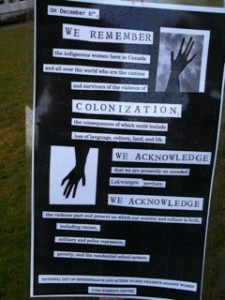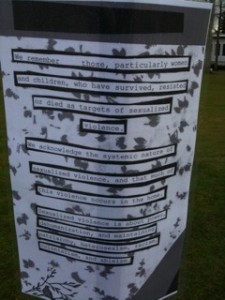Twenty one years ago a man shot 27 women at Montreal’s l’École Polytechnique. Fourteen women died in the so-called Montreal Massacre. On this National Day of Action on Violence Against Women — December 6 — Christie Shaw Roome tells her story.
Out of the corner of  my eye, I see my left arm, a cobalt blue sleeve, rise into the air. My body has responded to a question before my brain even has a moment to consider. I am at the annual December 6th memorial. I have attended almost every one during my years of studying and working at the University of Victoria. The woman who is speaking has asked if those who feel comfortable will raise their hands – I know what she is going to say before she gets to the end of her question – if those who have experienced violence, if you are comfortable, will you raise your hand?
my eye, I see my left arm, a cobalt blue sleeve, rise into the air. My body has responded to a question before my brain even has a moment to consider. I am at the annual December 6th memorial. I have attended almost every one during my years of studying and working at the University of Victoria. The woman who is speaking has asked if those who feel comfortable will raise their hands – I know what she is going to say before she gets to the end of her question – if those who have experienced violence, if you are comfortable, will you raise your hand?
It is done. My arm is in the air and I’m not daring to look around to see if there are others. My peripheral vision tells me that there are at least two, though I feel like I’m the only one. The guy in front of me turns around and he sees my arm is raised; he sees me. After I lower my arm, I realize that I have shocked myself. I have never hidden the fact that I was sexually assaulted, but it is so very personal. There are people surrounding me who I see everyday. People I work with. People who are now wondering, “What happened to her?”
I live in Canada and it is it is the National Day of Action on Violence Against Women. It is a day that is inspired by the so-called Montréal Massacre. Twenty-one years ago, an angry young man walked into a classroom of 60 at l’École Polytechnique and separated the men from the women. He told the men to leave and then he spent the next 45minutes firing off his .22 calibre rifle.
When he was done, he h ad shot 27 women— 14 were dead. While he stood on desks and looked behind doors, hunting for women, he said, “J’haïs les féministes [I hate feminists].” In his suicide note, he said feminists “have always ruined my life.”
ad shot 27 women— 14 were dead. While he stood on desks and looked behind doors, hunting for women, he said, “J’haïs les féministes [I hate feminists].” In his suicide note, he said feminists “have always ruined my life.”
His name was Marc Lepine and his story is complicated. His own father was a misogynist who was physically and psychologically abusive towards his son. His mother, Monique, left his father and started over, returning to nursing and taking classes to advance her career while raising her two children on her own. Marc and his younger sister Nadia often stayed with neighbors when Monique was studying and working. His father abandoned them. Marc was also part Algerian and a likely target of racial slurs and maybe even violence.
The women he killed were singled out because they were women. I was assaulted because I am a woman. Not long ago, my husband took our sons away on an overnight trip to Granny’s house. It was designed to be a respite for me. I had two whole days, one whole night and a morning to sleep in: all for me. It was my first night alone in the house we bought over a year ago.
I double checked locks, secured windows and demanded of our family cat that he sleep with me. I woke up several times; twice I got up to check doors again. I let the black cloud of bad memory rush into me. I remembered the details and I felt the fears seep back into my blood stream as I recalled the night 20 years ago when an unknown man broke into my apartment and sexually assaulted me. So much for respite.
Perhaps that is why my arm went up so automatically. The wound was slightly reopened, a pinprick of blood trickling. On a continuum of severity, the assault on me was mild. Even the police said so. At the time, this comment was not helpful and the anger that ensued was like nothing I had ever experienced.
 I used to walk down the street, my Doc Martin boots landing hard and accusing on the pavement. I would imagine myself grabbing a man, any faceless man, and punching him. I would feel my blood heat and my heart spin at the thought of taking his head and slamming it on the curb of the sidewalk repeatedly. The anger clotted in my brain, reducing me to instinct. It was almost too much for me to handle. But the police said I got off easy and, by the way, did I know that my sliding glass door was unlocked?
I used to walk down the street, my Doc Martin boots landing hard and accusing on the pavement. I would imagine myself grabbing a man, any faceless man, and punching him. I would feel my blood heat and my heart spin at the thought of taking his head and slamming it on the curb of the sidewalk repeatedly. The anger clotted in my brain, reducing me to instinct. It was almost too much for me to handle. But the police said I got off easy and, by the way, did I know that my sliding glass door was unlocked?
It took me years to find a safe place for all the emotion. After anger, I was scared. After fear, I was sad. In the meantime, I became a feminist and I helped to organize the rallies I attended. In the end, the only way I could overcome the obstacle of that black cloud was to humanize the man who attacked me.
Two of my women friends helped me plan a ritual and I painted a piece of driftwood. One side was smooth and the face I painted was innocent and a bit sad. The other side was twisted; the face I created was angry and tortured. I had to believe that the human being that did this to me was also in pain. To move on, I needed to forgive him. To forgive him, I needed to believe that someone had hurt him first. This didn’t excuse him, by any means, in my mind. What it did was bring me to a place of acceptance, strength and balance.
Nothing excuses Marc Lepine for what he did. Fourteen women who would have been contributing engineers, leaders in their communities, never had the opportunity to fulfill their dreams, to become mothers or to achieve professional success. But he was a human being who was shaped by his life, by the people and circumstances around him. He had a mother who loved him and who was shocked, ashamed and devastated by what her son did. And, now I am a mother of two sons and when I think of the fear I experienced that night 20 years ago, I wonder if it even touches the fear I harbour now — the fear that one day, one of my sons might do something violent. I’m no longer convinced that it would be any less painful to be the mother of rape victim or the mother of a rapist.
After the memorial, I walked down the pathway flanked by placard signs reminding us why December 6th is still relevant. Two young male students pass me and I hear one say, “I guess we’re ‘sposed to remember something.” The other one answers, “I think some guy wigged and shot people.” I was enraged. They didn’t know and I wanted to run over, cuff them on the head in a motherly way and educate them. I didn’t, though, because they were taller than me and I’m still not brave enough to start something.
But in the moment I promised myself that I would tell my children. I will tell them my story and more…
Anne St-Arneault, 23; Geneviève Bergeron, 21; Hélène Colgan, 23; Nathalie Croteau, 23; Barbara Daigneault, 22; Anne-Marie Edward, 21; Maud Haviernick, 29; Barbara Klueznick, 31; Maryse Laganière, 25; Maryse Leclair, 23; Anne-Marie Lemay, 22; Sonia Pelletier, 23; Michèle Richard, 21; and Annie Turcotte, 21.
I give you a minute of my silence and an eternity of my respect.
Photo Credits
Photos courtesy of Christie Shaw Roome


National Day of Action on Violence Against Women…
Here at World Spinner we are debating the same thing……